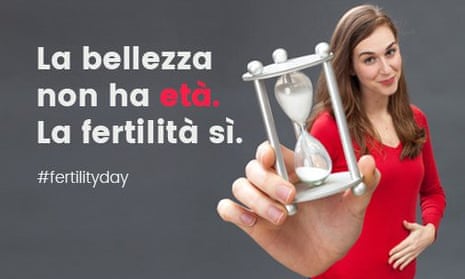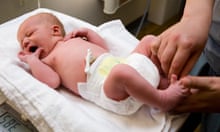Italy woke up last week to a series of offensive images that could have been published in the 1930s, including the slogan “Beauty knows no age. Fertility does.” They were sexist, ageist – and promoted by the government and health minister Beatrice Lorenzin to publicise 22 September, which it has designated fertility day. On this day, people will be able to “get more information” on how to procreate and be happier, which, as the bestselling author Roberto Saviano puts it, offends “all the people who don’t have children and those who would like to have some but can’t because there is no work in Italy”.
According to the official website: “The first fertility day will be celebrated to attract attention to the topic of fertility and its protection,” and “to underline the danger of falling birth rates in our country”. It also says it wants to focus on “the beauty of maternity and paternity” and “medical help for those people who are having problems conceiving”. The site offers information about how Italian regions will be involved, with doctors, pharmacists and clinics available to give advice to those interested in the subject of procreation. And in four major Italian towns – Rome, Bologna, Padova and Catania – there will be events to promote fertility and discussions on the subject.
In and of itself that might not have been cause for such a furore – but what has ignited anger is not just the idea of procreation as a matter for the state to intervene in, but the images associated with it: a series of photos of pregnancy, and some troubling adverts, such as one where a woman holds an hourglass to show that her biological clock ticking away.
The reaction has been fierce, with many questioning if there is not a better way to encourage people to have children – by promoting employment policy, for example, and by helping the economy to grow more after many years of recession. Only in the last six months has Italy started to recover from a long period of economic trouble. But growth is slow and unemployment is still very high – over 40% – among the under-25s.
It’s that age group that also feels put out . One of the slogans, “reproducing is the best way for young couples to be creative”, has been roundly condemned by many newspapers including La Repubblica, La Stampa and even Il Giornale – with headlines such as “The web attacks the health minister for her slogan: We need to make more children.”
But it is the use of the images and what they say about the place of women in Italy that has offended so many people, including those who choose not to have children for their own reasons. Why should they be discriminated against? The recent law on civil unions approved by the Italian parliament a few weeks ago gave many the impression that the state had finally accepted a broader idea of the family, but now this campaign puts the emphasis back on discrimination. Women are targeted by this fertility campaign, as if they were the only people responsible for the declining birthrate that has been affecting Italy for many years.
It all sounds so similar to the fascist slogans of the 1930s, when posters on the walls incited women to give more children to the fatherland. Many cannot believe that a female minister has launched such a sexist, ageist, anachronistic campaign in a country where many other urgent problems remain to be addressed.










